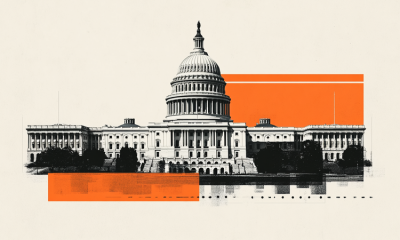

others
Pound Sterling drops as UK economy enters in a technical recession – Crypto News
- Pound Sterling faces a sharp sell-off as the UK Q4 GDP contracted by 0.3%.
- The BoE may consider aggressive rate cuts due to easing inflation, slowing wage growth and poor economic outlook.
- The US Dollar corrects as investors digest the Fed’s hawkish narrative.
The Pound Sterling (GBP) falls back in Thursday’s early European session as the United Kingdom economy enters into a technical recession. The preliminary Gross Domestic Product (GDP) data from the UK Office for National Statistics (ONS) shows that the economy contracted by 0.3% in the fourth quarter. This means the UK economy has contracted for the second straight quarter in a row – the definition of a technical recession. The data could also ignite expectations of early rate cuts by the Bank of England (BoE), who may be keen to introduce growth-stimulating policies.
The broader appeal for the Pound Sterling has weakened as majority of economic indicators apart from the economic contraction are pointing to aggressive rate cuts by the BoE to avoid further contraction. The Pound Sterling tends to face foreign outflows when expectations for the BoE turning dovish escalate.
The consumer price inflation remained steady in January while investors forecasted it to accelerate further. Also, BoE Governor Andrew Bailey sees price pressures taming to the required target by Spring.
While wage growth and service inflation are still skewed to the upside and therefore unlikely to bring inflation down to the 2% target, the moderate decline in wage growth momentum is clearly visible.
Meanwhile, the US Dollar has faced some backfilling after a sharp rally inspired by cooling expectations of early rate cuts by the Federal Reserve (Fed). Investors now expect the Fed to hold interest rates unchanged in the range of 5.25%-5.50% till June monetary policy meeting.
Daily Digest Market Movers: Pound Sterling retreats as BoE rate-cut hopes escalate
- Pound Sterling faces a sharp sell-off as the United Kingdom ONS has reported that the economy contracted by 0.3% in the last quarter of 2023. Investors anticipated a deceleration of growth of 0.1%.
- The UK GDP also contracted in the third quarter of 2023, indicating the economy meets the criteria for a technical recession.
- This has escalated hopes of early rate cuts by the Bank of England as the economy desperately needs the stimulus provided by lower borrowing costs.
- This week, the expectations for an early unwinding of the restrictive policy stance by the Bank of England were already prompted by a steep slowdown in wage growth and steady annual inflation figures.
- Meanwhile, the inflation outlook softened on Wednesday after BoE Governor Andrew Bailey said inflation will come down to the target by spring.
- Andrew Bailey warned that wage growth and service inflation are still too high to be consistent with the central bank’s target of 2%.
- Bailey mentioned that policymakers would support rate cuts only after getting evidence that wage growth is receding.
- The monthly Manufacturing Production for December rose steadily by 0.8% MoM, while investors anticipated a stagnant performance. On an annual basis, the economic data grew at a higher pace of 2.3% against expectations of 0.6% and the prior reading of 1.9%.
- Monthly Industrial Production was up by 0.6% against 0.5% growth in November. Investors anticipated a decline of 0.1%. Surprisingly, the annual factory data rose by 0.6% while investors forecasted a contraction of 0.1%.
- On the United States front, the US Dollar Index (DXY) has gradually corrected from a three-month high of 105.00 as investors realize that the Federal Reserve will not cut interest rates sooner.
- The broader appeal for the US Dollar is upbeat as investors are now pricing in only three rate cuts this year, as guided by the Fed, after stubborn inflation data.
- Going forward, January’s monthly Retail Sales data will guide the US Dollar, which will be published at 13:30 GMT. According to the estimates, the economic data contracted by 0.1% against a 0.6% increase in January.
Technical Analysis: Pound Sterling declines toward 200-DEMA
Pound Sterling retreats from day’s high near 1.2570 as the UK economy has shifted into a technical recession. The GBP/USD pair is expected to resume its downside journey towards the 200-day Exponential Moving Average (EMA), which trades around 1.2520. More downside seem likely as the 20 and 50-day EMAs are on the verge of delivering a bearish crossover.
The 14-period Relative Strength Index (RSI) struggles to hold above 40.00. Failing to hold the same would trigger a bearish momentum.
BoE FAQs
The Bank of England (BoE) decides monetary policy for the United Kingdom. Its primary goal is to achieve ‘price stability’, or a steady inflation rate of 2%. Its tool for achieving this is via the adjustment of base lending rates. The BoE sets the rate at which it lends to commercial banks and banks lend to each other, determining the level of interest rates in the economy overall. This also impacts the value of the Pound Sterling (GBP).
When inflation is above the Bank of England’s target it responds by raising interest rates, making it more expensive for people and businesses to access credit. This is positive for the Pound Sterling because higher interest rates make the UK a more attractive place for global investors to park their money. When inflation falls below target, it is a sign economic growth is slowing, and the BoE will consider lowering interest rates to cheapen credit in the hope businesses will borrow to invest in growth-generating projects – a negative for the Pound Sterling.
In extreme situations, the Bank of England can enact a policy called Quantitative Easing (QE). QE is the process by which the BoE substantially increases the flow of credit in a stuck financial system. QE is a last resort policy when lowering interest rates will not achieve the necessary result. The process of QE involves the BoE printing money to buy assets – usually government or AAA-rated corporate bonds – from banks and other financial institutions. QE usually results in a weaker Pound Sterling.
Quantitative tightening (QT) is the reverse of QE, enacted when the economy is strengthening and inflation starts rising. Whilst in QE the Bank of England (BoE) purchases government and corporate bonds from financial institutions to encourage them to lend; in QT, the BoE stops buying more bonds, and stops reinvesting the principal maturing on the bonds it already holds. It is usually positive for the Pound Sterling.
-

 Blockchain1 week ago
Blockchain1 week agoCrypto execs cheer as Australia appoints pro-crypto assistant minister – Crypto News
-

 Business6 days ago
Business6 days agoHow Mid-Sized Treasurers Are Managing Liquidity Amid Uncertainty – Crypto News
-

 Blockchain1 week ago
Blockchain1 week agoUS property manager tokenizes multifamily properties on Chintai blockchain – Crypto News
-

 Blockchain1 week ago
Blockchain1 week agoTop Expert Declares It The Best Crypto To Buy Now – Crypto News
-
Business1 week ago
No Truth to Truth Social Memecoin: World Liberty Financial Clarifies – Crypto News
-
others1 week ago
Why Is Crypto Market Down When S&P 500 Flashes Bull Run Ahead? – Crypto News
-

 others1 week ago
others1 week agoHackers Attempting To Extort School Employees via Email After Millions of Students’ Personal Data Leaked in Breach: Report – Crypto News
-
Business1 week ago
XRP Flips Tether’s USDT By Market Cap Reclaiming 3rd Spot, Price Rally To $3? – Crypto News
-
Business1 week ago
Crypto News: Animoca Brands Eye NYSE Listing Amid Donald Trump’s Crypto Push – Crypto News
-

 others1 week ago
others1 week agoMoonX: BYDFi’s On-Chain Trading Engine — A Ticket from CEX to DEX – Crypto News
-

 others1 week ago
others1 week agoAnalyst Sees Crypto Repeating Dot-Com Bubble, Predicts Rallies for XRP and One Solana Challenger – Crypto News
-
Technology1 week ago
XRP Price Prediction as Binance Data Reveals Early Signs Of Bull Run – Crypto News
-
others1 week ago
SEC Crypto Roundtable: Paul Atkins Vows To Make US Crypto Capital Of The World – Crypto News
-

 others1 week ago
others1 week agoInvestor Kidnapped, Driven to Remote Desert and Robbed of $4,000,000 in Cryptocurrency by Teenagers: Report – Crypto News
-

 others1 week ago
others1 week agoUSD/JPY falls below 148.00 despite persistent uncertainty over BoJ’s policy outlook – Crypto News
-
Metaverse1 week ago
Why AI is central to the new browser wars – Crypto News
-
Business1 week ago
Can WIF Price Hit $2? Pattern Breakout and 100% OI Surge to $445M Signal Major Upside – Crypto News
-

 others1 week ago
others1 week agoAUD/USD gains after softer CPI data from the US and trade developments – Crypto News
-
others1 week ago
Breaking: US SEC Delays Decision on Grayscale Spot Solana and Litecoin ETFs – Crypto News
-

 Technology1 week ago
Technology1 week agoBest wireless soundbars in 2025: Top 10 picks to elevate your home audio experience – Crypto News
-

 Blockchain1 week ago
Blockchain1 week ago10 Signs a Crypto Investment Platform Is a Scam—and How to Avoid It – Crypto News
-
Technology1 week ago
Pi Coin Crashes 33% As Pi Network Community Screams ‘Betrayal’ – Crypto News
-
Business1 week ago
Bitcoin Price Risks Dropping Below $100k As Crypto Liquidations Hit $714M – Crypto News
-
others1 week ago
Pepe Coin Price Outperforms DOGE and SHIB, Targets 80% Upside Post-Retest – Crypto News
-

 Blockchain1 week ago
Blockchain1 week agoTop Expert Declares It The Best Crypto To Buy Now – Crypto News
-

 Technology1 week ago
Technology1 week agoiQOO Neo 10 vs Motorola Edge 60 Pro: Which smartphone to buy under Rs.35000 – Crypto News
-

 others1 week ago
others1 week agoSilver trims early gains, holds above 50-day EMA as weak US CPI tempers Fed tightening bets – Crypto News
-
Cryptocurrency1 week ago
Ripple (XRP) Price Analysis: $5.5 Billion XRP Open Interest Signals Positive Reaction to Paul Atkins’ Latest Update – Crypto News
-
Business1 week ago
Ripple (XRP) Price Analysis: $5.5 Billion XRP Open Interest Signals Positive Reaction to Paul Atkins’ Latest Update – Crypto News
-
Technology1 week ago
Ripple (XRP) Price Analysis: $5.5 Billion XRP Open Interest Signals Positive Reaction to Paul Atkins’ Latest Update – Crypto News
-

 Blockchain1 week ago
Blockchain1 week agoAlarm bells ring in US over OpenAI’s crypto project World – Crypto News
-

 others1 week ago
others1 week agoTests 100.50 support, with nine-day EMA providing backing – Crypto News
-
Business1 week ago
COIN Stock Soars 23% Ahead of Coinbase’s May 19 Debut on S&P 500 – Crypto News
-

 Cryptocurrency1 week ago
Cryptocurrency1 week agoWhy investors should say ‘no’ more often – Crypto News
-

 Cryptocurrency1 week ago
Cryptocurrency1 week agoWhy investors should say ‘no’ more often – Crypto News
-
![Nifty 50 Index Elliott Wave technical analysis [Video]](https://dripp.zone/news/wp-content/uploads/2025/05/Nifty-50-Index-Elliott-Wave-technical-analysis-Video-Crypto-400x240.jpg)
![Nifty 50 Index Elliott Wave technical analysis [Video]](https://dripp.zone/news/wp-content/uploads/2025/05/Nifty-50-Index-Elliott-Wave-technical-analysis-Video-Crypto-80x80.jpg) others1 week ago
others1 week agoNifty 50 Index Elliott Wave technical analysis [Video] – Crypto News
-

 others6 days ago
others6 days agoCrypto Trader Prints 517x Profit on Solana-Based Altcoin That’s Exploded 7,000% in Just One Week: Lookonchain – Crypto News
-

 Blockchain6 days ago
Blockchain6 days agoStablecoin bill passes in Northern Marianas as House overrides veto – Crypto News
-
others6 days ago
Dogecoin On-Chain Metrics Hint At DOGE Mega Rally Ahead – Crypto News
-

 Blockchain6 days ago
Blockchain6 days agoSolana Poised For Upside Move After A Bounce From $168 – Crypto News
-
others6 days ago
XRP Futures ETF Goes Live on May 19: Will It Beat ETH And BTC Debut? – Crypto News
-

 Cryptocurrency6 days ago
Cryptocurrency6 days agoTop crypto to buy as Saudi Central Bank reveals exposure to MSTR – Crypto News
-

 Cryptocurrency6 days ago
Cryptocurrency6 days agoUK confirms crypto tax data rules under CARF; first deadline set for May 2027 – Crypto News
-

 Technology6 days ago
Technology6 days agoCoinbase estimates $400M cost after data breach and crypto scam – Crypto News
-
Business5 days ago
World Liberty Financial Partners Chainlink To Enable USD1 Stablecoin Cross-Chain Transfers – Crypto News
-

 Blockchain5 days ago
Blockchain5 days agoBitcoin Panic Buying? Eric Trump Says the World Is Stockpiling BTC – Crypto News
-

 Cryptocurrency5 days ago
Cryptocurrency5 days agoRipple’s XRP may enable BRICS to ditch dollar and settle trade in gold – Crypto News
-
Technology5 days ago
XRP Price Impact If GENIUS Act Boosts Ripple’s RLUSD Market Cap to 50% of Tether’s $150B – Crypto News
-

 Cryptocurrency1 week ago
Cryptocurrency1 week agoXRP Price Nears $2.50 Support As Fundamentals Bring Record Highs In Sight – Crypto News
-

 Technology1 week ago
Technology1 week agoSamsung Galaxy Z Fold 7 tipped to outsize last-gen Z Fold 6: Check details – Crypto News










